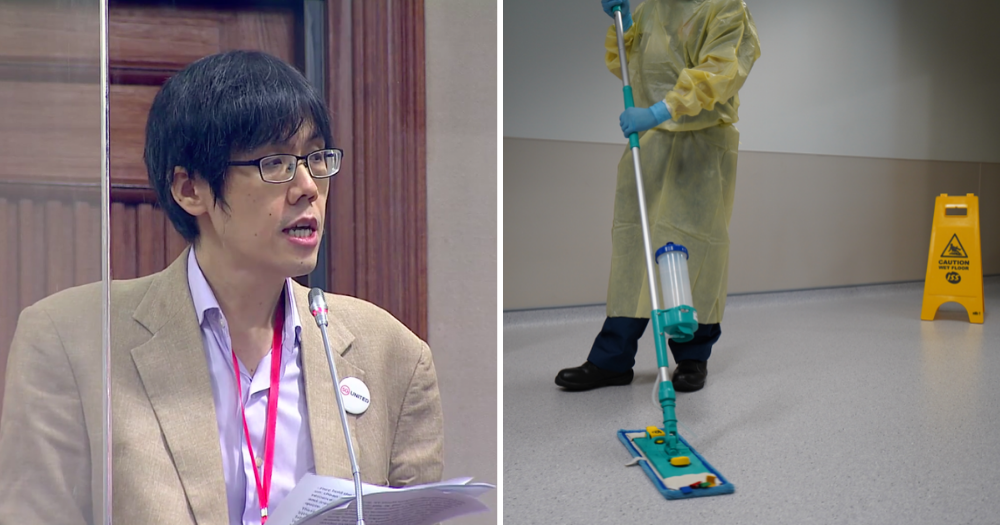Singapore must restructure how it values essential service and manual jobs, said Nominated Member of Parliament Walter Theseira in his Fortitude Budget debate speech on Thursday (Jun. 4).
In his speech, Theseira examined Singapore's reliance on low-wage migrant workers, and pushed for better treatment and regard for typically low-paid essential and manual jobs.
Does having migrant workers affect the wages of local workers?
Theseira pointed out that Singapore, like many successful cities in history, has grown rapidly due to migration:
"We permit migration to grow the economy faster than our purely local labour force can. This gives us a bigger pie so that everyone — migrants and locals alike — can meet their needs and aspirations better."
However, he noted, "migration creates winners and losers" and stated that there is an "obligation" to the public to understand the effects and consequences of labour migration, whether they are positive or negative.
Theseira compared statistics of construction workers in the U.S. with those in Singapore — of the locals working in construction in Singapore, who comprise approximately 20 per cent of the total construction workforce, almost half of them are PMETs (professionals, managers, executives and technicians).
In the U.S., on the other hand, only a quarter of construction workers are PMETs.
Thus, within the construction industry, access to migrant labour allows local Singaporeans to be employed in the higher-skilled positions, said Theseira.
However, he also brought up other industries, such as F&B services or the cleaning industry, where the proportion of foreign workers is also high.
In those cases, the wages and conditions of locals working in the sectors are not as good as those of locals working in construction, and it is worth considering if the presence of migrant labour could push the wages and benefits for locals downwards, he said.
"We should ask whether this is because migrant labour in these sectors often fill the same types of jobs that locals do, including supervisor positions.
It is the degree of substitutability that matters, and migrant labour in many service sectors could potentially replace local labour, which would then pressure wages and benefits downwards."
Singapore needs to publicise research on effects of migrant labour
There have been relatively few rigorous pieces of publicly-available research on the effect of migrant labour on the Singapore economy and labour market, said Theseira.
Highlighting a 2013 World Bank report on immigration in Malaysia which found that migrant labour improved employment and wages for medium to high-skilled Malaysians, but also had negative effects for the lowest-skilled Malaysians, Theseira advocated for such research to be conducted and the results released in Singapore as well:
"...The quality of the public discourse is harmed when such research is not put into the public eye, is not taught or conducted by our universities, and is not debated by the public.
This is an issue that goes beyond politics. It is part of the democratic discourse that we need to progress as a nation."
One part of the discourse, Theseira explained, is to "examine the hidden costs to social stability when we expect to have a first-world standard of living delivered at third-world prices."
Singaporeans benefit from the system of low-wage and migrant labour, whether or not they personally employ a migrant worker, he said:
"The high quality of life that we take for granted is built in part on the ceaseless toil of a vast, trickle-up economy of hundreds of thousands of migrant workers, Malaysian day workers, and even our own Singaporean low-wage workers.
Singapore's over-reliance on cheap migrant labour cannot be an excuse for not working toward a solution, though, said Theseira:
"The unseen engine behind global cities worldwide is a vast army of essential workers who are frequently paid too little to live next to those they provide services to.
Singapore has been able to cope in part because migrant workers and Malaysian day workers are willing to do these jobs at wages which are nearly unliveable in Singapore."
He added, "A great society is able to confront the unpleasant realities beneath the surface, and resolve to make painful but necessary changes for collective progress."
No shame in Singaporeans taking up manual, service jobs
As the country faces the question in the coming months about how to restructure our society and economy, said Theseira, we cannot fall into the temptation to use the reserves to go back to preserving the past economic model.
One step is to reframe how we think about what has typically been considered "low-skilled work", and recognising that all work — socially-essential work in particular — have value.
Theseira likened the current economic model, which is that Singaporeans take up PMET jobs while migrant workers cover the rest, to running an army consisting of only sergeants and officers.
He added that there should be no shame in Singaporeans taking on manual and service jobs:
"The only shame is if we, who have power and influence, fail to ensure that the conditions of work and wages in these service jobs are such that Singaporeans find no dignity in taking them up."
That way, rather than having an economy where most Singaporeans are pushed toward holding PMET jobs, Singapore could build an economy of craftsmen, technicians, and service workers who are both skilled and decently-paid, said Theseira.
"Our collective indifference to the struggles of low wage workers in Singapore, whatever their nationality, has hurt our ability to cope with this crisis and will continue to harm our ability to build a compassionate and resilient society.
If we fail to build the capacity to question, understand, and reform our system as necessary, to provide better treatment and living wages for low-wage workers, we will each bear the complicity of the bystander."
Top images screencaptured via CNA and by Jane Zhang.
If you like what you read, follow us on Facebook, Instagram, Twitter and Telegram to get the latest updates.
